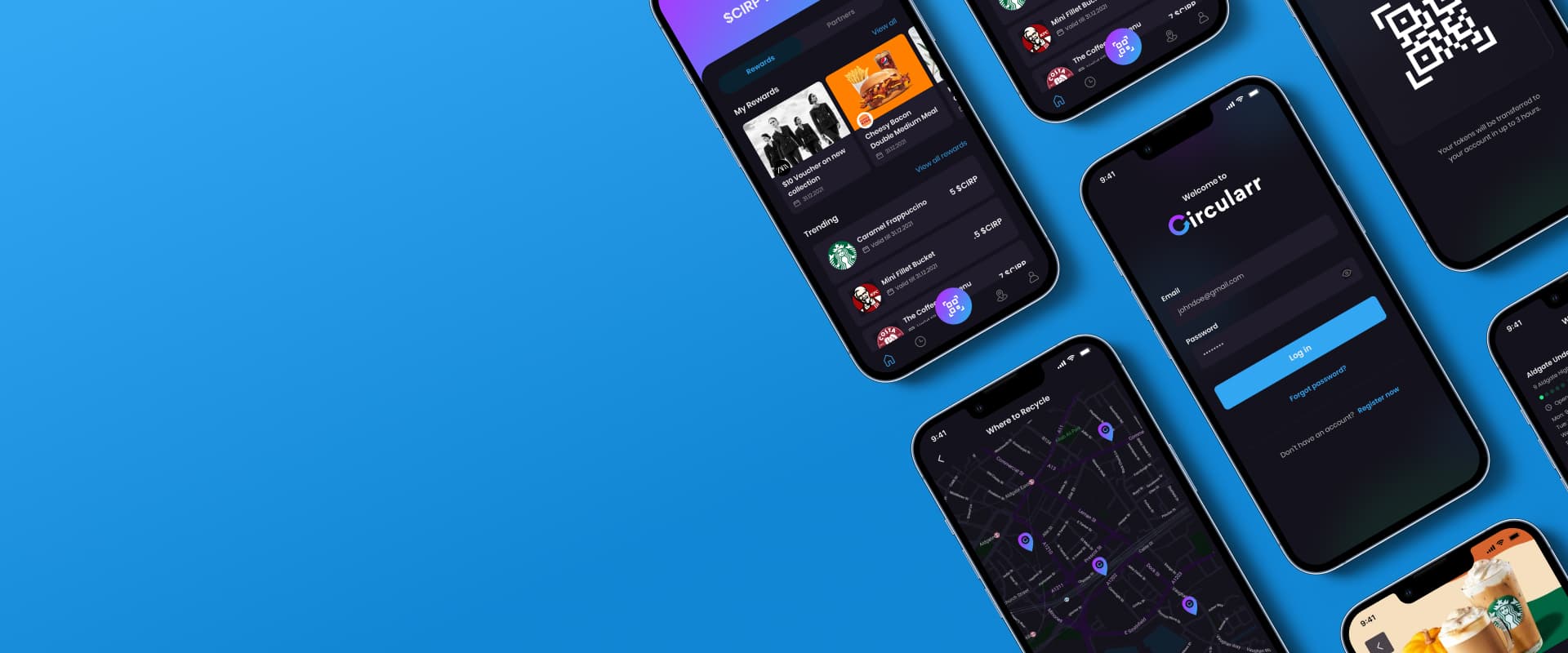
- Home
- Success stories
- Circularr
About the client
Details
- Website:https://circularr.com/
- Location:London, United Kingdom
- Founded:2021
Project goals
- 1
Design a recycling ecosystem consisting of different tools and apps for all parties involved in the recycling process
- 2
Provide a robust framework that can be easily integrated into existing 3rd party software and infrastructure, thus allowing for a rapid development
- 3
Introduce a high-level business strategy
- 4
Execute the ecosystem’s connection and adjustment with reverse vending machines
- 5
Work out and implement a comprehensive tokenomics strategy and flow
Work done
- Fully-fledged plastic waste recycling network
- Integration of reverse vending machine software with the backend of the admin panel
- Convenient admin panel for managing the ecosystem’s core processes
- Cross-platform mobile user wallet for managing tokens
- Advanced track & trace app for tracking plastic waste management
Project background
Plastic waste and pollution have attracted mounting concerns in recent years. It’s been reported that around 380 million tons of plastic are produced yearly. Worryingly, this volume is forecast to double by 2040.
Keen to make a difference and alleviate the burden on the environment, our customer decided to develop a sophisticated recycling network that would reduce the level of plastic pollution and incentivize people to take part in optimizing plastic waste management while receiving rewards for their active participation.
The concept envisioned creating a high-tech recycling ecosystem that would bring together plastic waste producers and recyclers and allow the latter to dispose of plastic bottles via connected reverse vending machines.
Why effective plastic waste management solutions are needed
380 million
tons of plastic are produced annually
100 million
marine animals are estimated to die from plastic waste each year
Only 1 in 5
plastic bottles are recycled
Up to 1000 years
is needed for a single plastic bottle to decompose
1500 plastic bottles
are thrown away every second daily
To bring this inspiring idea to life, the client reached out to our PixelPlex development team. We joined hands and worked together to produce a solution that would help tackle plastic waste issues and make this world a better place.
Solution
Our team delivered a decentralized, Ripple-powered plastic recycling network comprising an admin panel intended for operating with an extensive database, a mobile wallet for managing tokens, and a cross-platform application for tracking deposited plastic.
We have also successfully integrated the network with RVM software and implemented a high-level tokenomics model, enabling the establishment of a high-end ecosystem and ensuring effective collaboration among all stakeholders.
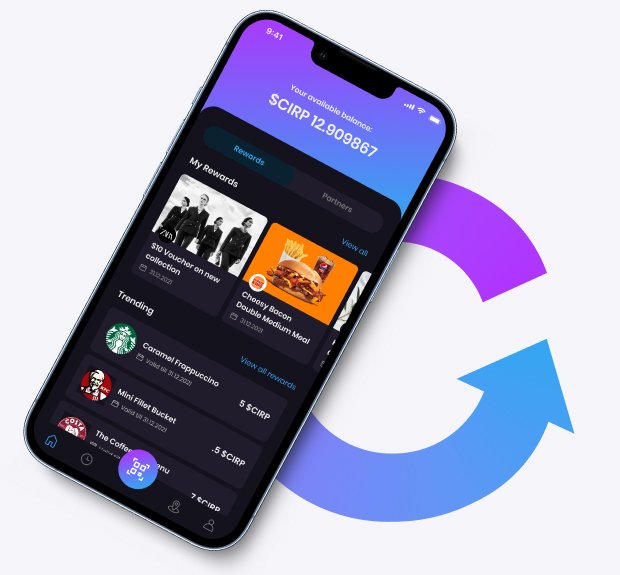
Technologies used
Details
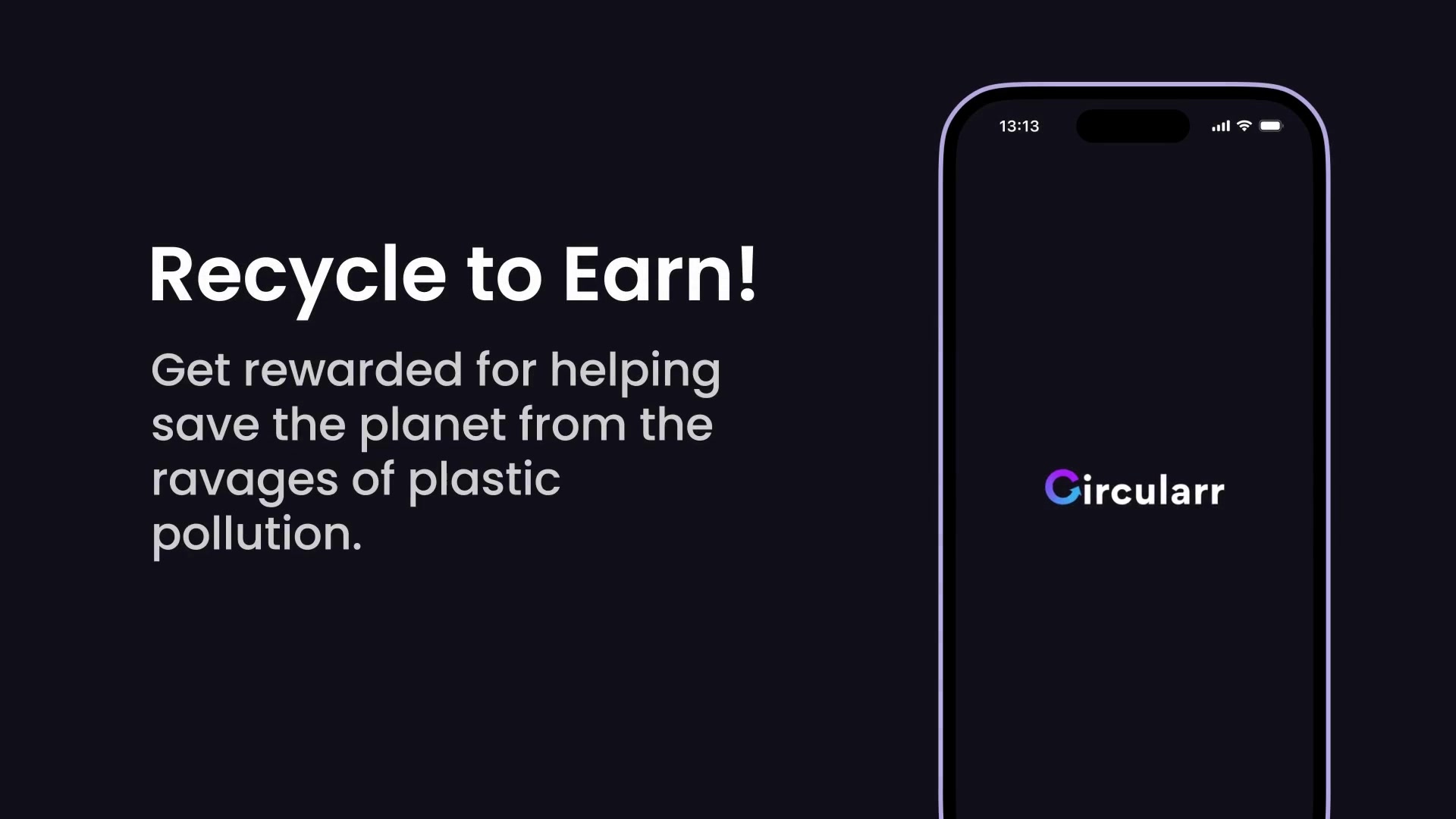
Admin panel
Our development team produced a web admin panel that consists of multiple tools and functionalities needed to efficiently operate with the entire ecosystem, manage its configurations and settings, and carry out oversight functions critical to the network.
The admin panel empowers the admins to accomplish the following:
View the ecosystem’s key statistics related to overall profit, reward selling, token performance, number of deployed RVMs, etc.
Add, manage, and track the list of the network’s partners
Place, sell, manage, sort, and advertise rewards as well as creating new ones
Maintain the RVM database and link an RVM to a geographical position on the map
Provide and edit information about administrators of the Circularr system (available to the Superadmin only)
Administer and supervise the user database, track and gather information about Circularr users, resolve account access issues, and so on
Track & trace app
To conveniently track multiple processes occurring at different stages of plastic waste management, the client required our engineers to design a special track & trace application.
The cross-platform mobile app allows users to easily trace and handle the following aspects of the ecosystem:
Employee management
The admin is responsible for adding data about new employees as well as setting up corresponding accounts in the admin panel, and tracking employee status and information such as email, phone number, etc.
Collection zones
Recyclers are distributed in accordance with the collection zone they are assigned to, and they collect plastic from RVMs located in those zones. Using the "Collection zones" blockchain-section, the SuperAdmin has the right to create/edit the data from a collection zone, upload a map showing zone borders, and see all the ecosystem’s zone borders.
Block management
Blocks are crumbled recycling materials. A block order unites a number of assembled blocks that have been collected by the recycler on a single route. The recycling network admin can handle block orders and their navigation, and see and manage their status (delivered, canceled, or in progress).
Advertisement
The admin is able to choose which advertisements to display on a vending machine. They can add and customize advertisements and then link them to a particular RVM.
Pellets
Made from deposited and recycled plastic, pellets can later be used as trading objects in the form of NFTs. The admin can track pellet status at the warehouse, and mint and sell pellet NFTs to partners.
User wallet
Our technical specialists created an easily navigable, cross-platform mobile wallet to enable users to receive and manage token rewards for depositing plastic bottles into vending machines. It allows users to view their balance, transaction history, relevant information about their rewards, purchased coupons, platform partners, and so on.
More importantly, the wallet contains an integrated Google Map functionality that marks RVM machines on the map using special indicators, thus helping a user quickly find an RVM near them. Besides, it provides a complete list of all vending machines available in the region with their corresponding addresses.
The cross-platform wallet possesses a QR-scan functionality. Once a user has found an RVM and deposited their plastic into it, they need to sign into their wallet and scan the QR code for that particular machine. Upon scanning the code, a user earns token rewards and has them transferred to their wallet. Equally, they can choose to send them directly to a charitable organization supported by the platform.
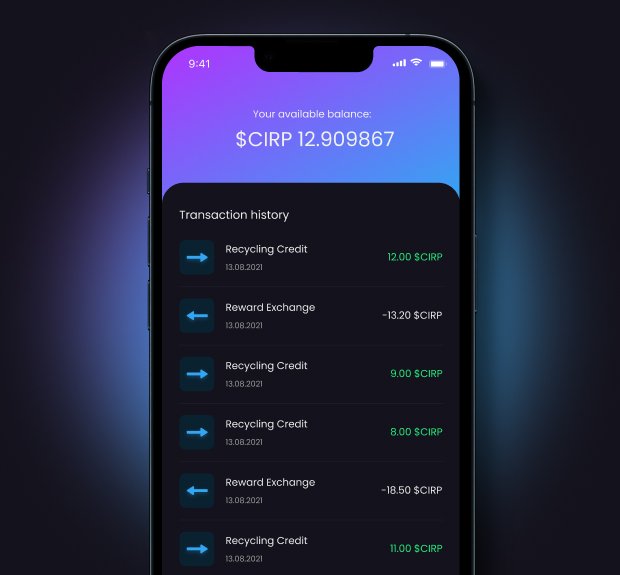
Why Ripple?
Alongside the customer, we performed thorough research and analysis of multiple blockchains and decided to opt for Ripple because it is one of the most environmentally-friendly protocols.
The Ripple blockchain underpins the recycle-to-earn ecosystem and user wallet and enables NFT minting.
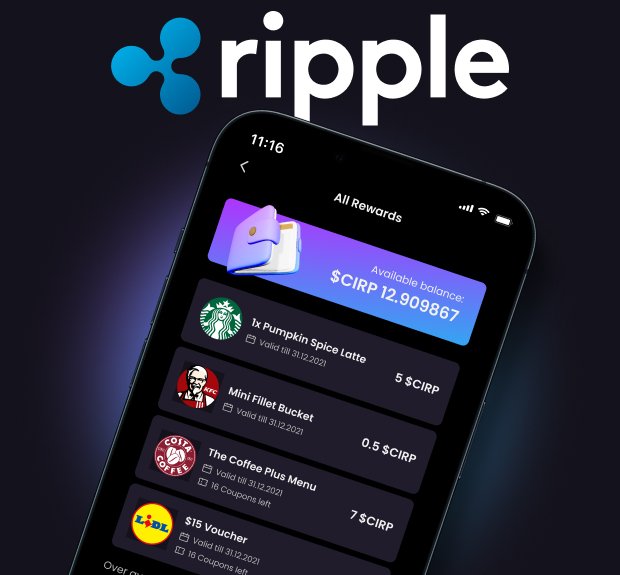
How the solution works
A user finds a supported reverse vending machine on the map and deposits a plastic bottle into it
A user scans the QR code on the vending machine and is redirected to their pre-installed mobile wallet to gain tokens for the deposited plastic
A user can exchange received tokens for discounts and gift certificates. Equally, they can sell their token via liquidity pools and receive funds via an online transfer or donate the proceeds to a charity
A plastic waste producer buys tokens on the market and delegates them to a recycler
A recycler makes a payment in tokens and receives bottles from a vending machine
The journey of the deposited plastic is traced via the track & trace mobile app
An admin receives a report about the number of plastic bottles produced and recycled. They also receive an NFT that serves as proof that the plastic has been recycled
Tokenomics concept
Given that the client wanted to incorporate tokens into the recycling system, we conducted numerous sessions and introduced the following tokenomics principles and criteria:
- 1
Each reverse vending machine is a wallet, initially pre-loaded with tokens
- 2
Users receive their rewards from RVMs into their mobile wallets
- 3
Users swap their tokens for discount coupons and gift cards within their wallets
- 4
Users can sell their tokens through liquidity pools and either receive funds via an online transfer or donate the proceeds to a charity from a list
- 5
Recyclers use wallets to transact with RVMs to retrieve bottles
- 6
Recyclers buy tokens from liquidity pools and use centralized wallets for multiple collection vehicles
- 7
Corporations buy tokens from liquidity pools using centralized wallets for multiple collection vehicles, and give them to recyclers
- 8
The ecosystem’s foundation controls the token supply
Project features
- Multicomponent network comprising tools and apps for all stakeholders
- Sophisticated tokenomics strategy
- User-friendly interface
- Ecosystem integration with RVM software
- Great visibility into the plastic waste management process
- Opportunity to cooperate effectively within a unified platform for the sake of the environment
Services
We offer a comprehensive range of services, including IT consulting, custom software development, and specialized expertise in blockchain, machine learning, and data science.
Blockchain Development
Blockchain Development
Smart Contract Development
Web3 Development
Blockchain Game Development
Crypto Payment Solutions
Tokenization Services
Protocols
Protocols
Cryptocurrency Exchange Development
Cryptocurrency Development
Marketplace Development
Dapp Development
DeFi Development
Top Development Company
Blockchain Consulting
Smart Contract Audit
Top Blockchain Consulting Company
Custom Software Development
Custom Software Development
Mobile App Development
Web Development
Top IT Services Company
IT Consulting
Top Consulting Company
ML Development
Artificial Intelligence Development
Machine Learning Development
Data Science Development
Top BI & Big Data Company
AR & VR Development
AR & VR Development
QA & Software Testing
QA & Software Testing Services
UI/UX DesignGive us the pleasure of adding our secret sauce to your app.
We’ll create beautiful screens at the front while breaking the limits of what’s behind them to help your app get to beyond-plausible business achievements.
UI/UX Design Services
MVP DevelopmentValidate your product idea quickly with an MVP—launch faster, test smarter, and refine based on real user feedback.
Leverage our expertise in MVP development to build a scalable, market-ready product with minimal risk and maximum efficiency.
MVP Development Services
Metaverse Consulting & Development
Top Development Company
Solutions
RWA PlatformTokenization makes it easier to trade assets and opens up new investment opportunities and diversifies portfolio.
RWA Platform
Asset tokenization platform development
Arbitrage BotProfit from market inefficiencies with automated, customized trading strategies that boost returns and minimize risk.
Arbitrage Bot
Be a transaction ahead. Catch profit at short notice
CryptoAPIGain an unfair data edge for your dApps. Tap into high-quality blockchain insights to outsmart competitors and fuel smarter decisions.
CryptoAPI
Connect your dApps to blockchain networks in a flash
OTC HawkOffer high-net-worth clients a secure, enterprise-grade trading terminal. Streamline deals, enhance reliability, and optimize top-tier crypto assets.
OTC Hawk
Benefit from our portfolio and wealth management app
DocFlowManage sensitive documents on blockchain. Leverage optional zero-knowledge proofs for trust, privacy, and streamlined workflows.
DocFlow
Intuitive Blockchain-Powered Document Management System
Know-Your-TransactionEnsure every transaction is above board. Monitor digital asset flows for compliance and transparency, supporting both businesses and regulators.
KYT crypto platform
Our KYT platform fosters integrity of financial ecosystems
Industries
We work across a variety of industries, from FinTech to eCommerce, leveraging our accumulated knowledge and best practices to deliver solutions tailored to the unique needs of your business.
FinTech & BankingAs traditional finance goes digital, we are committed to building efficient ecosystems and better engagement.
Think of customized FinTech solutions with tamper-proof transactions and storage, progress transparency and automation — and we’ll make them see the light of day.
$25T
Global Financial Services
20%
Digital/Blockchain Growth
Solutions for FinTech & Banking
PaymentWe build secure and seamless payment software solutions that increase revenue, reduce friction, and scale with your business.
If you're integrating payments into your platform and need a team with deep financial technology expertise, we'll help you engineer transactions with precision and reliability.
$9.5T
Global Digital Commerce Value
30%
Growth in Embedded Finance
Payment
Retail & eCommerceWhether you market B2B or B2C, commerce tech trends are all about value-driven purposes, global sustainability, hybrid shopping journeys, and extra-resiliency.
Let your clients know that there’s more to your brand than meets the eye by creating unique customer experiences in all your stores.
$6.3T
Global eCommerce
10-15%
Tech Innovation Growth
Solutions for Retail & eCommerce
Supply Chain & LogisticsTo make things easier for all vendors, we deliver apps for route and cost optimization, vehicle operational support, and better dispatch time efficiency.
With focus is sustainability, resilience, transparency, and immutability, let’s get your transformation going.
$10T
Global Logistics
15-20%
Blockchain Adoption Growth
Solutions for Supply Chain & Logistics
HealthcareCustom healthcare software solutions are aimed at helping you ensure accurate diagnosis, better patient engagement, and positive healthcare outcomes.
Whether you require a patient management solution, practice management software, EMR/EHR system, or ML-enabled diagnostics – we’ve got you covered.
$10T
Global Healthcare
20%
Digital/Blockchain Growth
Solutions for Healthcare
Real EstateKeep up with digital innovation trends by accelerating enterprise transformation and scaling, leveraging data and orchestrating workflows.
Whether you manage and sell commercial facilities or invest third-party capital, our integrated solutions help you make the most of it.
$340T
Global Real Estate
15%
PropTech/Blockchain Growth
Solutions for Real Estate
Oil & GasWith mobility and digital technologies standing to change the game and define leadership, our mission is to get you digital-first.
Resolve operational and conceptual issues by introducing clear tech vision, feasible architectures, and flexible software to take business extension off limits.
$4T
Global Oil & Gas Industry
10-15%
Digital/Blockchain Growth
Solutions for Oil & Gas Industry
InsuranceImagine a world where quoting policies, processing claims, and managing mountains of paperwork are effortless. PixelPlex can help you achieve just that.
Break free from outdated systems and focus on what truly matters – delivering exceptional service to your policyholders and growing your insurance business.
$25T
Global financial services
20%
Digital/blockchain growth
Solutions for Insurance Industry
FitnessWe create custom fitness software solutions that support meaningful training and steady engagement from the first session.
If you’re building a digital product for active users and need a team with real project experience behind it, we’ll help you bring it to life with clarity and purpose.
$257B
Global Fitness Industry
24%
Digital Growth
Solutions for Fitness
BankingFinancial systems face continuous change and ongoing scrutiny throughout their lifecycle as products evolve.
Our solutions are designed to stay predictable under regulatory oversight and daily operational load, helping teams build systems they can rely on.
$191T
Global Bank Assets
62%
Digital Payments Use
Solutions for Banking
RestaurantCustom restaurant management software allows for reducing costs, smooth internal CRM and delivery systems integration, and easy scalability.
We develop restaurant ecosystems that turn your complex business data into actionable insights that the whole team can understand and use.
$4.2T
Global Food Service Market Value
+7.2%
Annual Growth Rate
Solutions for Restaurant
TravelCustom software development for travel helps agencies to get rid of fragmented operations and make decisions based on data, and with an aim of future growth.
We offer travel software solution development services that transform internal operational data into clear, actionable insights that the whole team can use.
$9.5T
Global Travel & Tourism Market Value
+5.8%
Annual Growth Rate
Solutions for Travel
Success stories
Domain
Industry
Protocols
Company
About us Team Careers Social Responsibility ContactsBlog
Blockchain Big Data Artificial Intelligence AR/VR Mobile News View Blog